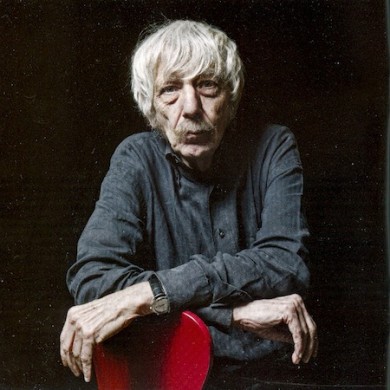de Leeuw and guests serve up fascinating Hungarian program with New World Symphony

Conductor Reinbert de Leeuw led the New World Symphony in a program of 20th-century Hungarian music Saturday at New World Center.
In Saturday evening’s Sounds of the Times program , “Double Double,” the New World Symphony provided a musical overview of three major Hungarian composers: Béla Bartók, György Ligeti, and György Kurtág. Guest conductor and contemporary music champion Reinbert de Leeuw led soloists from Ensemble Modern and the NWS fellows in a fascinating survey spanning the 20th century.
Kurtág’s two companion works, 1987’s …quasi una fantasia… for Piano and Groups of Instruments, Op. 27 No. 1 and 1989’s Double Concerto for Piano, Cello, and Two Chamber Ensembles, Op. 27 No. 2, explore spatial placement of the musicians throughout the hall. Choirs of strings, winds and brass encircled the audience from above, while the audience itself encircled musicians on the dimly lit stage. The effect is like aural 3-D: novel at first, slowly deepening into a subliminally enhanced experience.
Supertitles indicated that …quasi una fantasia… “begins on the border of imperceptibility,” but guest pianist Hermann Kretzschmar’s impossibly quiet scales still stunned. Cradled by rattling percussion around the hall, the “Introduction” culminated with a harmonica choir. A severely contrasting “Fast, Menacing and Mournful (Like a Tangled Dream)” plunged each instrumentalist into twisted melodies of dense counterpoint. Equally unexpected were the bombastic peals of monolithic brass, wind, and piano chords in the static “Recitative.” For a breathtaking finish, a childlike piano chorale in the “Aria – Adagio molto” echoed throughout the ether in strings, recorders, and muted brass.
In Kurtág’s Double Concerto, cellist Matt Haimovitz joined Kretzschmar and two identical chamber ensembles. The work was anchored in the duo’s imitative lines, surrounded by clouds of spiky droplets in paired harps, celestas, mallets, and cimbaloms, large hammered dulcimers common in Hungarian music. In later sections, antiphonal brass choirs supplied complementary bombast to Kretzschmar’s enormous dynamic range and precise, frenetic fingerwork.
Particularly captivating was Haimovitz’s smeary detuned and retuned cello, with sub-basement tones underlined by subtle contrabassoon. Ending placidly, the work melted into rich chords echoing through the ensembles, and repeated, rocking piano chords accentuated by a soft bass drum heartbeat. Although many were clearly unfamiliar with the music, no one left at intermission.
In the opening “Calmo, con tenerezza” of the Double Concerto for Flute, Oboe and Orchestra from 1972, György Ligeti’s signature cluster chords pass serenely through small forces of winds, low strings, and muted brass quartet. Ensemble Modern’s flutist Dietmar Wiesner and oboist Christian Hommel outlined the melded, gentle dissonances, with slightly bent pitches adding shimmer. Similar suspensions in the “Allegro corrente” rippled with trills and tremolos, swarming repeated notes and tiny, energized figures. Each soloist emerged with percolating phrases as the movement devolved into fiercer, jagged riffs. Precise, elegant control from de Leeuw and the responsive ensemble gave a flawless, riveting performance.
Béla Bartók’s Suite from The Miraculous Mandarin, Op. 19 channels the psychosexual zeitgeist of the early 20th century. Its storyline includes forced prostitution, murderous thugs, and a supernatural mandarin ultimately killed by love. NWS’s large orchestral forces pulsed and pounded through agitated, dark colors for a frenzied rendition. Macabre dances admit a seedy jazz element, and lockstep dissonant, powerful string melodies underscore the anxiety. Brad Whitfield’s furtive clarinet solos added a sordid element, and the mandarin’s alarming brass chords thrilled, with exceptionally frantic solos in the trombones.
Posted in Uncategorized
Leave a Comment
Sun Jan 19, 2014
at 12:37 pm
No Comments




